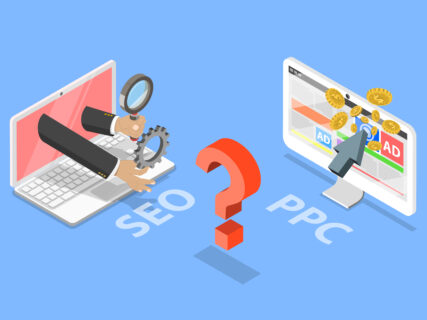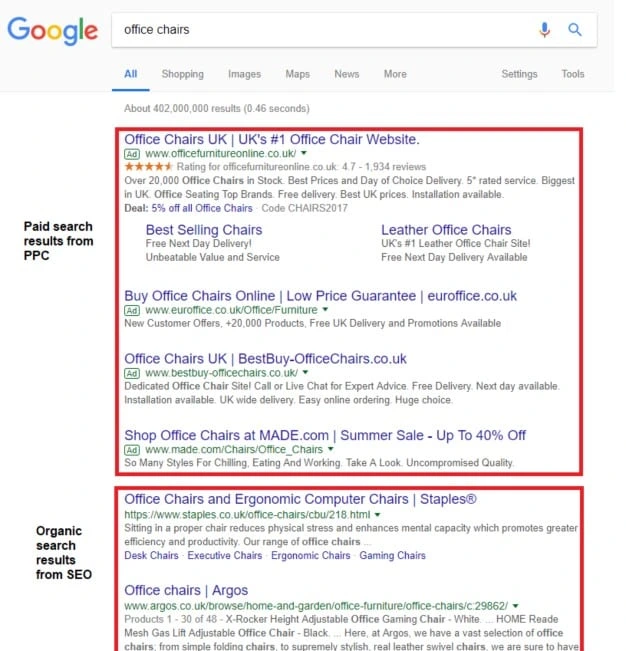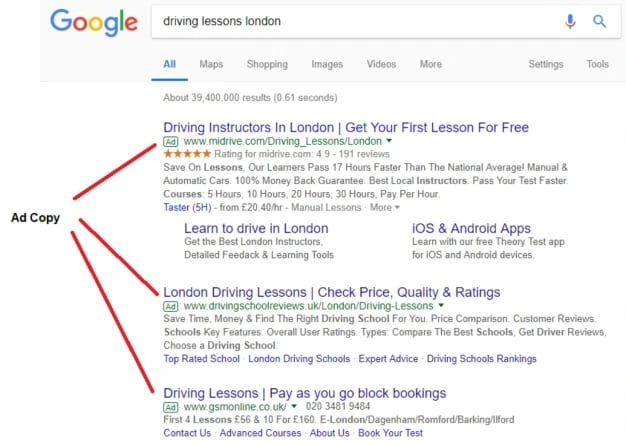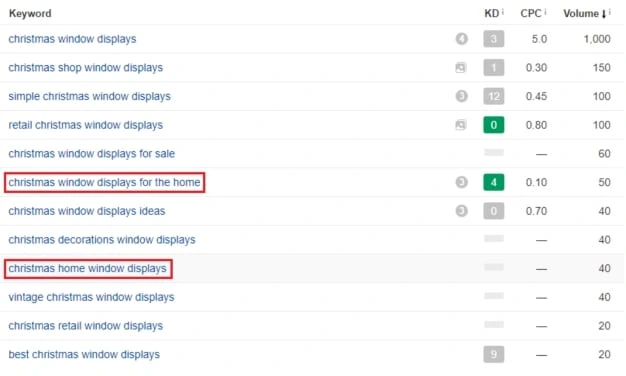
10 mins
OpenSEO vs PPC: The pros, cons, and how they can complement each other in a search campaign
5 mins
Although PPC and SEO are two separate fields of search marketing, their objective is the same – to obtain visibility, traffic and revenue from search. We examine the ways in which PPC and SEO strategies can benefit each other.
10th July 2018

Although PPC and SEO are technically two separate concepts, their objective is the same – to obtain visibility, traffic and revenue from search.
SEO and PPC are often treated as distinctively separate areas, which makes sense as they are unique entities, but that doesn’t mean that they don’t have an effect on one another or that their strategies shouldn’t be integrated. In this article, we will discover the various ways in which both PPC and SEO can complement each other, making both processes more effective and improving the overall search strategy.
Although PPC and SEO are technically two separate concepts, their objective is the same – to obtain visibility, traffic and revenue from search. For the purpose of this article, when talking about PPC we will use Google AdWords, the most money making product of Google. Google is the go-to search engine these days, with 90.31% market share worldwide. Why shouldn’t we then take advantage of AdWords mechanisms and apply it to our SEO strategy?
Before we dive in, first, let’s start with some basics.
SEO (Search Engine Optimisation) is a process of optimising various parts of a website in order to gain more visibility in search results and, as a result, more traffic to the website. SEO specifically focuses on getting websites to rank in organic search – the 10 lists on each page of search results.
Most of the times SEO is a long term process, yielding results after a considerable amount of time and work have been invested. This is why many websites look to paid results to attract initial traffic, as they can pay to appear in paid search which appears above “organic search” results.

PPC (Pay Per Click), also known as ‘paid search’ is a way of attracting traffic to the website by Paid Ads. The advertiser is being charged a fee each time someone clicks on their ad. To encourage this, Paid Ads appear above (and below, and sometimes to the side of) the organic listings.
PPC ads are run on websites, for example Google AdSense, on the search engines, for example Google AdWords on Google or Bing Ads on Bing, and various social media platforms, such as Facebook Ads, Twitter Ads, LinkedIn Ads and Instagram Ads, just to name a few.
Because your Paid Ads appear as soon as you complete your campaigns set up PPC, unlike SEO, can yield results instantly.
A well planned and executed SEO campaign establishes long-lasting results for a prolonged time after an SEO campaign has been finished, though often it is an ongoing process. PPC benefits finish as soon as the PPC campaign is stopped, which could be due to a time or budget/spend limit.
From the above you might be led to think that SEO and PPC really do operate on their own, so let’s see in what ways these marketing strategies complement each other and how that can lead to a more successful search marketing strategy.
One of the puzzles of a successful SEO campaign is finding relevant keywords for your SEO Campaign.Though there are many tools that can give you Search Volumes, the number of searches per month for a certain term, the best source for this data should be the search engine you want to be visible in, for example Google. Google shares this kind of data in the most privileged/detailed way those using their paid advertising service, Google AdWords.
Google AdWords gives very detailed insights into the conversion and click through rates (CTR) of the keywords that have been chosen for a PPC campaign, so that you can determine which keywords have the highest conversion rate and apply them to your SEO strategy.
If you use PPC to check the keywords you are looking to use in your campaign, you’ll get a good initial indication of which keywords would work and which wouldn’t. In this way, you don’t need to spend months to see if instincts are correct.
Also, as PPC is a refining process, you can use this data to improve your PPC Ads to attract more clicks to your site while you work on your website’s SEO.
If you do use Google AdWords to test keywords for your SEO campaign, you’ll notice that they have a brilliant feature which includes a list of all search terms that people have typed in prior to clicking on your ad.
This is a great opportunity for you to discover new, especially long tail, keywords you may never have even thought of, with a better precision that many keyword tools offer.
In order to get those valuable paid clicks, you have to create ads. In Google AdWords you are able to create multiple ads targeting the same keywords, allowing you to carry out A/B testing.

Looking at what competitors are doing, as well as how your differently phrased ads, can help you to identify what gets users clicking. The data on conversion and click through rates will help you refine different pieces of ad copy until you find the most effective text.
You can then incorporate the high performing ad text into the metadata on your pages – metadata is what shows up in the organic listings for search results – and into the copy on your website’s pages, in order to help your SEO strategy.
When performing keyword research for an SEO campaign you can unravel the types of keywords that you definitely know are not relevant to your business and you wouldn’t like to spend your ad budget on.
Take a look at the example below where the aim of the PPC campaign is to attract big brand stores to use your ‘christmas window displays’ design services.
From carrying out SEO on the website, you would have figured out that “christmas window displays for home” was a popular search term. You wouldn’t like to include in your PPC keyword lists words like ‘home’, as users who search for these terms are definitely not falling into your desired target audience. As any click on your ad from this type of search would be a waste of money (probably), you know to mark all such irrelevant keywords with a considerate volume of searches as ‘negative keywords’ in your PPC campaign.

Marking these keywords as negative keywords in the PPC campaign will mean you don’t spend your valuable budget on wasted clicks, and have more for the more relevant terms.
Integration of SEO and PPC can result in a number of benefits starting with maximising visibility in both paid and organic results. With an aligned effort of SEO and PPC you can dominate both paid and organic listings on a single search results page. That gives an impression of dominating and being an authority in a given niche and as a result maximise traffic to the website and increase conversions.
Thanks to the nature of pay per click advertising, which produces very quick results, the insights from PPC can inform SEO strategy by discovering the most relevant keywords, choosing the best performing title tags and meta descriptions and discovering long tail keywords for content creation.
Similarly, a traditional keyword research for SEO can filter out the very irrelevant keywords you would not like to spend even a penny on your PPC campaign and mark them as negative keywords instead.
Although PPC and SEO on the surface appear to be completely different areas, in fact, they are two sides of the same coin with a joint objective of getting visibility and driving traffic to the site from search. Joining both forces can only help the overall search performance and should be encouraged.